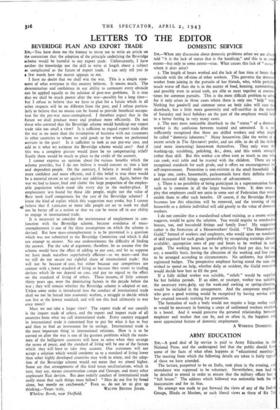DOMESTIC SERVICE Sm,—When any discussion about domestic problems arises we
are alwas told "it is the lack of status that is the handicap," and this is to s extent—but only to some extent—true. What causes this lack of " status where it does arise?
a. The length of hours worked and the lack of free time at hours tha coincide with the off-time of other workers. This prevents the domesn worker from joining in the pursuits of her friends, who, while probabl much worse off than she is in the matter of food, housing, surrounding and possibly even in actual cash, are able to meet together at commo -.times for common pursuits. This is the.most difficult problem to soh• for it only arises in those cases where there is only one "help " kep Nothing but goodwill and common sense on both sides will cure du drawback, but a little more generosity and self-sacrifice in the man of Saturday and local holidays on the part of the employer would hel to a better feeling in very many cases.
2. The next most noticeable drawback to the " status " of a domesti worker is the confusion between trained and untrained. It is no sufficiently recognised that there are skilled workers and what migh be called " domestic labourers." Many housewives (like the writer of recent article in The Spectator) prefer, and are able, to do all the skille (and more interesting) housework themselves. They only want th washing-up, scrubbing, polishing, &c., done, and this needs strengq rather than skill. But this worker can often earn as much as one wh' can cook, wait table and be trusted with the children. There are n' recognised standards for each grade, and it offers no encouragement fo self-improvement. Promotion is non-existent in the small household. I a large one, cooks, housemaids, parlourmaids have their definite duties and increased skill brings opportunities of advancement.
3. There is no possibility of being participant in a superannuation fun such as is common in all the larger business firms. It does seem pity that employers could not unite in some sort of Federation that woul enable them to offer such benefits. Of course, if the Beveridge Repot becomes law this objection will be removed, and the treating of th housewife as a definite individual will add greatly to the value of domesu workers.
I do not consider that a standardised school training, as a recent write suggests, would be quite the solution. You would require to standardis houses, too, and household fittings and family lives! My suggestio rather is the formation of a Houseworkers' Guild. " The Homemaker' Guild," formed of workers and employers, who would agree on standards of skill required for each grade (preferably by recognising trainings ahead' available), appropriate rates of pay and hours to be worked in ear grade. The working hours not to be arbitrarily fixed per day, but on say, a monthly basis, leaving the allocation of the working and free tin to be arranged according to circumstances. No uniforms, but definit• registered badges. The prospective employer having stated the sum sh• wished to spend on help, whether daily or resident, the Guild executiv would decide how best to fill the post.
If a fully skilled worker was suitable, " reliefs " would be suppli for her holiday periods. If an older, or younger, worker was suitabl the necessary extra4belp, say for week-end cooking or spring-cleaning would be included in the arrangement. And the competent employ who gave a good training would be recognised by having service wi her counted towards training for promotion.
The formation of such a body would not require a large outlay mu as would be necessary in forming a corps of uniformed workers residen in a hostel. And it would preserve the personal relationship betwee employer and worker that can be, and so often is, the happiest an' most appreciated feature of domestic employment.
A WORKING DOMESTIC.


























 Previous page
Previous page